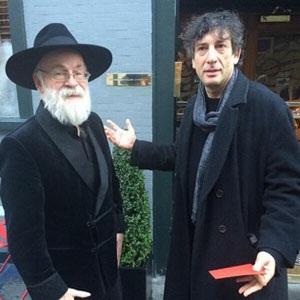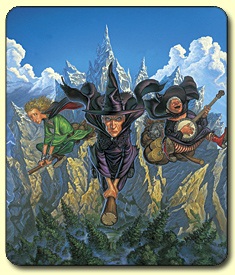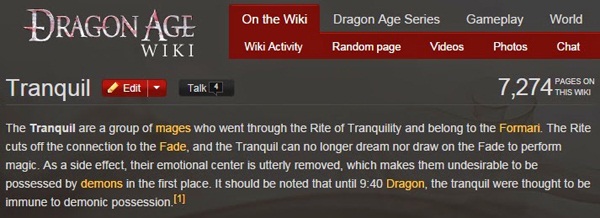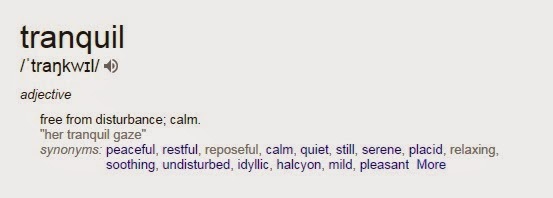
This piece originally appeared on Laura Shortridge's blog.
In an article for The Guardian, Neil Gaiman has spoken about his friend and co-author of their best-selling book Good Omens, Sir Terry Pratchett.
“Terry Pratchett isn’t jolly, he’s angry.”
Sir Terry, who received his well-deserved knighthood for "services to literature" in 2009, is a comedy fantasy author best known for his Discworld series, and has probably been the biggest influence in my life.
His books are works of art - brilliantly written, deathly funny, and ridiculously deep. You cannot read his works and avoid thinking, but he packages incredible life-lessons and commentaries on the world in pure, completely hysterical, entertainment.
He's also angry.
Gaiman's article addresses the widely spread myth that Pratchett is some sort of twinkling little elf. A jolly little Father Christmas. This, Gaiman explains, isn't true.
He recounts a time when Sir Terry got horribly angry. A small mistake, the decision to walk to a studio where they were meant to be interviewed, (it was further than they thought) turned into missing most of the interview, angering the radio station, and infuriating Pratchett.
He didn't shout and scream. His anger was silent, but it was there. Boiling, raging, he was livid.
Eventually, Gaiman tentatively suggested it was time to not be angry any more. Sir Terry's response:
Terry looked at me. He said: “Do not underestimate this anger. This anger was the engine that powered Good Omens.” I thought of the driven way that Terry wrote, and of the way that he drove the rest of us with him, and I knew that he was right.
Anyone who's read Pratchett should know immediately that he's right.
All authors tend to have a part of themselves in at least one of their characters. "Write what you know." When you think about Pratchett's most driven characters, his best ones in my opinion, they're driven by anger. Commander Vimes is constantly threatening to bubble over with rage, and Granny Weatherwax is probably the best angry feminist ever written.

It's well known she's held together by rage. Image source: PJSM Prints
I'm reminded of Hogfather, where death's granddaughter, Susan Sto Helit, is a governess. One of her charges, a six year old girl, mentions advice Susan gave to her on how to deal with fear.
"Susan says don't get afraid, get angry."
It's advice I've given my own children, with mixed results, but I never fully realized it's advice from Sir Terry given to us. I never realized it's how he views anger as something worth having, worth cultivating, and something that can be harnessed and used.
I knew his characters were often angry, but I never realized he didn't consider anger a flaw.
I think again of Granny Weatherwax, a character I love and strongly identify with in a 'I can never be that amazing but I do have the same flaws' kinda way, and something she said in Lords and Ladies that has always stuck with me, one of the first scenes that made me realize how much I can empathize with her,
“When you're lonely, and people around you seem too stupid for words, and the world is full of secrets that no one'll tell you . . . ”
“Are you reading my mind?”
“Yours?” Granny's attention snapped back, and her voice lost its distant quality. “Hah!"
I always knew Granny had a willpower of iron, and Commander Vimes, and Terry Pratchett. I've always known it's their best quality. I've just never fully understood what drives that willpower.
It's the anger.
And something clicks. I'm angry as well.
This is often mentioned as something I should be ashamed of, but the only shame I feel is when I use my anger badly, when I don’t harness it.
I don't feel ashamed of being angry, not when my anger is justified.
Oh, I'm scolded for my anger many times, reminded that anything is better than being angry.
I'm often told, (by people I usually neither respect nor care to be anything like) that I should learn how to ignore things that bother me, and let injustices and cruelty carry on. I must learn to shut my eyes and ears like others, who merrily spend their lives having free-spirited fun and carefully ignoring anything and everything that might cause them to feel a bit upset about the world and those in it.
Don't look at it. Don't challenge it. Don't fight it. Quietly ignore it. Always avoid conflict at any costs. Just have fun. Just focus on good vibes. "Fit in or fuck off." Do not, whatever you do, be angry.
You know what? Fuck that.
As Neil Gaiman says,
"That anger, it seems to me, is about Terry’s underlying sense of what is fair and what is not. It is that sense of fairness that underlies Terry’s work and his writing, and it’s what drove him from school to journalism to the press office of the South Western Electricity Board to the position of being one of the best-loved and bestselling writers in the world."
It's ok to be angry. It's natural to be angry. It's good to be angry. The important thing is how you harness and use that anger.
My anger has helped me every step of my life.
Yes, often I haven't used it well, but without my anger, I probably wouldn't be who I am today.
I wouldn't have done any of the things that I'm proud of. I would be this sad and meek little girl, quietly keeping my head down and my nose clean, and seeking approval from people I have no reason to respect or even like.
"Look at how much trouble I'm not causing. Look at how good I am at accepting bullshit. Look at how many waves I'm not making. Please like me."
That doesn't mean I don't think there's anything in the negative stigma surrounding anger. Anger unharnessed can be horribly destructive.
Terry Pratchett taught me how to use fantasy to understand reality. He taught me how stories are used to explain how things really work. And here, I realize, is an analogy:
Anger is magic.
In most fantasy, intelligence and willpower are the two attributes that are the most important for magic. Magic is the ability to create, and to change.
Almost always, the possessor of magic is a danger to herself and others until she learns how to control that magic.
Bring in anger, and it all makes sense.
Harnessed anger can be used to generate willpower. Combine willpower with intelligence and you have the ability to create and change.
You can create art, art that matters. You can change the world. That's sure as hell what Sir Terry Pratchett does with his anger.
But if you never learn to harness and control that anger...

Image source: Shutterstock
Magic-users are often stigmatized, because of the destruction they can cause. There are those who always feel the best way to control magic-users is to take away or suppress their magic.
For example, in the Dragon Age games, sometimes it's decided that a mage's magic needs to be removed completely by making them "Tranquil".


"Don't be angry. Anger is bad."
Maybe that's why it's always so important, in every universe from Discworld to Harry Potter, for magic-users to learn or be taught how to control and use their magic.
It's a pretty cool thought, and one I like quite a bit.
Follow Laura on Twitter or visit her blog.
Follow Women24 on Twitter and like us on Facebook.
In an article for The Guardian, Neil Gaiman has spoken about his friend and co-author of their best-selling book Good Omens, Sir Terry Pratchett.
“Terry Pratchett isn’t jolly, he’s angry.”
Sir Terry, who received his well-deserved knighthood for "services to literature" in 2009, is a comedy fantasy author best known for his Discworld series, and has probably been the biggest influence in my life.
His books are works of art - brilliantly written, deathly funny, and ridiculously deep. You cannot read his works and avoid thinking, but he packages incredible life-lessons and commentaries on the world in pure, completely hysterical, entertainment.
He's also angry.
Gaiman's article addresses the widely spread myth that Pratchett is some sort of twinkling little elf. A jolly little Father Christmas. This, Gaiman explains, isn't true.
He recounts a time when Sir Terry got horribly angry. A small mistake, the decision to walk to a studio where they were meant to be interviewed, (it was further than they thought) turned into missing most of the interview, angering the radio station, and infuriating Pratchett.
He didn't shout and scream. His anger was silent, but it was there. Boiling, raging, he was livid.
Eventually, Gaiman tentatively suggested it was time to not be angry any more. Sir Terry's response:
Terry looked at me. He said: “Do not underestimate this anger. This anger was the engine that powered Good Omens.” I thought of the driven way that Terry wrote, and of the way that he drove the rest of us with him, and I knew that he was right.
Anyone who's read Pratchett should know immediately that he's right.
All authors tend to have a part of themselves in at least one of their characters. "Write what you know." When you think about Pratchett's most driven characters, his best ones in my opinion, they're driven by anger. Commander Vimes is constantly threatening to bubble over with rage, and Granny Weatherwax is probably the best angry feminist ever written.

It's well known she's held together by rage. Image source: PJSM Prints
I'm reminded of Hogfather, where death's granddaughter, Susan Sto Helit, is a governess. One of her charges, a six year old girl, mentions advice Susan gave to her on how to deal with fear.
"Susan says don't get afraid, get angry."
It's advice I've given my own children, with mixed results, but I never fully realized it's advice from Sir Terry given to us. I never realized it's how he views anger as something worth having, worth cultivating, and something that can be harnessed and used.
I knew his characters were often angry, but I never realized he didn't consider anger a flaw.
I think again of Granny Weatherwax, a character I love and strongly identify with in a 'I can never be that amazing but I do have the same flaws' kinda way, and something she said in Lords and Ladies that has always stuck with me, one of the first scenes that made me realize how much I can empathize with her,
“When you're lonely, and people around you seem too stupid for words, and the world is full of secrets that no one'll tell you . . . ”
“Are you reading my mind?”
“Yours?” Granny's attention snapped back, and her voice lost its distant quality. “Hah!"
I always knew Granny had a willpower of iron, and Commander Vimes, and Terry Pratchett. I've always known it's their best quality. I've just never fully understood what drives that willpower.
It's the anger.
And something clicks. I'm angry as well.
This is often mentioned as something I should be ashamed of, but the only shame I feel is when I use my anger badly, when I don’t harness it.
I don't feel ashamed of being angry, not when my anger is justified.
Oh, I'm scolded for my anger many times, reminded that anything is better than being angry.
I'm often told, (by people I usually neither respect nor care to be anything like) that I should learn how to ignore things that bother me, and let injustices and cruelty carry on. I must learn to shut my eyes and ears like others, who merrily spend their lives having free-spirited fun and carefully ignoring anything and everything that might cause them to feel a bit upset about the world and those in it.
Don't look at it. Don't challenge it. Don't fight it. Quietly ignore it. Always avoid conflict at any costs. Just have fun. Just focus on good vibes. "Fit in or fuck off." Do not, whatever you do, be angry.
You know what? Fuck that.
As Neil Gaiman says,
"That anger, it seems to me, is about Terry’s underlying sense of what is fair and what is not. It is that sense of fairness that underlies Terry’s work and his writing, and it’s what drove him from school to journalism to the press office of the South Western Electricity Board to the position of being one of the best-loved and bestselling writers in the world."
It's ok to be angry. It's natural to be angry. It's good to be angry. The important thing is how you harness and use that anger.
My anger has helped me every step of my life.
Yes, often I haven't used it well, but without my anger, I probably wouldn't be who I am today.
I wouldn't have done any of the things that I'm proud of. I would be this sad and meek little girl, quietly keeping my head down and my nose clean, and seeking approval from people I have no reason to respect or even like.
"Look at how much trouble I'm not causing. Look at how good I am at accepting bullshit. Look at how many waves I'm not making. Please like me."
That doesn't mean I don't think there's anything in the negative stigma surrounding anger. Anger unharnessed can be horribly destructive.
Terry Pratchett taught me how to use fantasy to understand reality. He taught me how stories are used to explain how things really work. And here, I realize, is an analogy:
Anger is magic.
In most fantasy, intelligence and willpower are the two attributes that are the most important for magic. Magic is the ability to create, and to change.
Almost always, the possessor of magic is a danger to herself and others until she learns how to control that magic.
Bring in anger, and it all makes sense.
Harnessed anger can be used to generate willpower. Combine willpower with intelligence and you have the ability to create and change.
You can create art, art that matters. You can change the world. That's sure as hell what Sir Terry Pratchett does with his anger.
But if you never learn to harness and control that anger...

Image source: Shutterstock
Magic-users are often stigmatized, because of the destruction they can cause. There are those who always feel the best way to control magic-users is to take away or suppress their magic.
For example, in the Dragon Age games, sometimes it's decided that a mage's magic needs to be removed completely by making them "Tranquil".


"Don't be angry. Anger is bad."
Maybe that's why it's always so important, in every universe from Discworld to Harry Potter, for magic-users to learn or be taught how to control and use their magic.
It's a pretty cool thought, and one I like quite a bit.
Follow Laura on Twitter or visit her blog.
Follow Women24 on Twitter and like us on Facebook.




 Publications
Publications
 Partners
Partners









